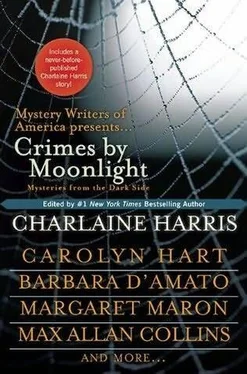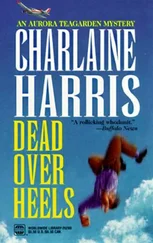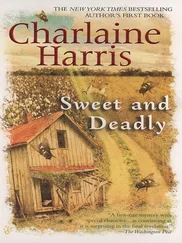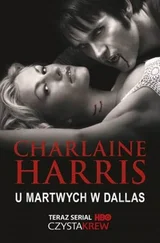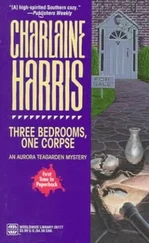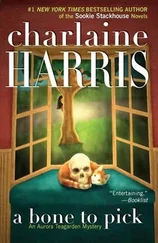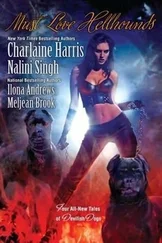He was six four, easy, towering over my six one; he wore the black uniform of a chauffeur, but no cap, his tie a loose black string thing. He looked like an upended Buick with a person painted on it. His head was the shape of a grape and just as hairless though considerably larger; he had no eyebrows, either; wide, bugling eyes; a lump of a nose; and an open mouth.
“Unnggh,” he said.
“I’d like to see Miss Riddle,” I said.
“Unnggh,” he said.
“It’s about Bill Reynolds. I represent his family. I’m here to ask some questions.”
His brow furrowed in something approaching thought.
Then he slammed the door in my face.
Normally, I don’t put up with crap like that. I’d been polite. He’d been rude. Kicking the door in, and his teeth, seemed called for. Only this boy was a walking side of beef that gave even Mike Hammer pause.
And I was, in fact, pausing, wondering whether to ring the bell again, go around back, or just climb in my heap and drive the hell away, when the door opened again, and the human Buick was replaced by a human goddess.
She was tall, standing eye-to-eye with me, and though she wore a loose-fitting white lab jacket that hung low over a simple black skirt, nylons, and flat shoes, those mountain-road curves Bill had mentioned were not easily hidden. Her dark blonde hair was tied back, and severe black-framed glasses rode the perfect little nose; she wore almost no makeup, perhaps just a hint of lipstick, or was that the natural color of those full lips? Whatever effort she’d made to conceal her beauty behind a mask of scientific sterility was futile; the big green eyes, the long lashes, the high cheekbones, the creamy complexion, that full, high-breasted, wasp-waisted, long-limbed figure, all conspired to make her as stunning a female creature as God had ever created.
“I’m sorry,” she said, in a silky contralto. “This is a private residence and a research center. We see no one without an appointment.”
“The gate was open.”
“We’re expecting the delivery of certain supplies this evening,” she said, “and I leave the gate standing open on such occasions. You see, I’m shorthanded. But why am I boring you with this? Good afternoon…”
And the door began to close.
I held it open with the flat of my hand. “My name is Michael Hammer.”
The green eyes narrowed. “The detective?”
I grinned. “You must get the New York papers up here.”
“We do. Hopeful isn’t the end of the world.”
“It was for Bill Reynolds.”
Her expression softened, and she cracked the door open, wider. “Poor Bill. Were you a friend?”
“Yes.”
“So you’ve come to ask about his death.”
“That’s right.” I shrugged. “I’m a detective.”
“Of course,” she said, opening the door. “And you’re looking into the circumstances. A natural way for you to deal with such a loss…”
She gestured for me to enter, and I followed her through a highceilinged entryway. The hairless ape appeared like an apparition and took my trench coat; I kept my porkpie hat but took it off in deference to my hostess.
In front of me, a staircase led to a landing, then to a second floor; gilt-framed family portraits lined the way. On one side was a library with more leather in bindings and chairs than your average cattle herd; on the other was a formal sitting room where elegant furnishings that had been around long enough to become antiques were overseen by a glittering chandelier.
She led me to a rear room and it was as if, startlingly, we’d entered a penthouse apartment-the paintings on the wall were abstract and modern, and the furnishings were, too, with a television/hi-fi console set-up and a zebra wet bar with matching stools; but the room was original with the house, or at least the fireplace and mantel indicated as much. Over the fireplace was the only artwork in the room that wasn’t abstract: a full-length portrait of my hostess in a low-cut evening gown, a painting that was impossibly lovely with no exaggeration by the artist.
She slipped out of her lab coat, tossing it on a boomerang of a canvas chair, revealing a short-sleeved white blouse providing an understated envelope for an overstated bosom. Undoing her hair, she allowed its length to shimmer to her shoulders. The severe black-framed glasses, however, she left in place.
Her walk was as liquid as mercury in a vial as she got behind the bar and poured herself a martini. “Fix you a drink?”
“Got any beer back there?”
“Light or dark?”
“Dark.”
We sat on a metal-legged couch that shouldn’t have been comfortable but was; she sipped her martini, her dark nyloned legs crossed, displaying well-developed calves. For a scientist, she made a hell of a specimen.
I sipped my beer-it was a bottle of German imported stuff, a little bitter for my taste, but very cold.
“That’s an interesting butler you got,” I said.
“I have to apologize for Bolo,” she said, stirring the cocktail with her speared olive. “His tongue was cut out by natives in the Amazon. My father was on an exploratory trip, somehow incurred the wrath of the natives, and Bolo interceded on his behalf. By offering himself, in the native custom, Bolo bought my father’s life-but paid with his tongue.”
With a kisslike bite, she plucked the olive from its spear and chewed.
“He doesn’t look much like a South American native,” I said.
“He isn’t. He was a Swedish missionary. My father never told me Bolo’s real name… but that was what the natives called him.”
“And I don’t suppose Bolo’s told you, either.”
“No. But he can communicate. He can write. In English. His mental capacity seems somewhat diminished, but he understands what’s said to him.”
“Very kind of you to keep somebody like that around.”
“Like what?”
I shrugged. “Handicapped.”
“Mr. Hammer…”
“Make it Mike-and I’ll call you Victoria. Or do you prefer Vicki?”
“How do you know I don’t prefer ‘Doctor’?”
“Hey, it’s okay with me. I’ve played doctor before.”
“Are you flirting with me, Mike?”
“I might be.”
“Or you might be trying to get me to let my guard down.”
“Why-is it up?”
She glanced at my lap. “You tell me.”
Now I crossed my legs. “Where’s your research lab?”
“In back.”
“Sorry if I’m interrupting…”
“No. I’m due for a break. I’d like to help you. You see, I thought a lot of Bill. He worked hard. He may not have been the brightest guy around, but he made up for it with enthusiasm and energy. Some people let physical limitations get in their way. Not Bill.”
“You must have a thing for taking in strays.”
“What do you mean?”
“Well… like Bolo. Like Bill. I understand you took in another handicapped veteran, not so long ago.”
“That’s right. George Wilson.” She shook her head sadly. “Such a shame. He was a hard worker, too-”
“He died the same way as Bill.”
“I know.”
“Doesn’t that strike you as… a little odd? Overly coincidental?”
“Mike, George was a heavy drinker, and Bill was known to tie one on himself. It may be coincidental, but I’m sure they aren’t the first barroom patrons to wobble into the street after closing and get hit by a car.”
“Nobody saw either one of them get hit by a car.”
“Middle of the night. These things happen.”
“Not twice.”
The green eyes narrowed with interest and concern. “What do you think happened, Mike?”
“I have no idea-yet. But I’ll say this-everybody seemed to like Bill. I talked to a lot of people today, and nobody, except maybe the police chief, had an unkind word to say about him. So I’m inclined to think the common factors between Bill and this George Wilson hold the answer. You’re one of those common factors.”
Читать дальше
